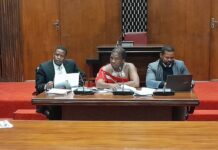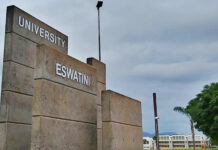The Christian community has been advised to introspect so as to ascertain why they are divided and not united in purpose.
Libandla Likamoyoyingcwele Church of the Holy Ghost’s Archbishop Joseph B. Simelane further questioned whether the existence of the three church bodies in the country was necessary.
| Eswatini Observer WhatsApp Channel
Simelane made these remarks yesterday during the stakeholder consultations on the religious policy organised by the ministry of home affairs, where various faith groups were invited to make submissions.
These included members of the Islamic faith, Baha’i faith, traditionalists, Tati, Shembe church, ZCC, Hindu, Jewish, Rastafarians and many more.
He said His Majesty King Mswati III had spoken about Nkwe during Sibaya, warning that if Christians did not act with urgency, the church could suffer irreparable damage.
“I am asking myself why the different denominations turned a blind eye until the situation reached this stage. If we are all Christians who believe in the Bible, we must all follow its teachings.
Faith is governed by God and the Holy Spirit, so I ask myself why we have three umbrella bodies, the Council, the Conference and the League of African Churches,” he said.
Simelane noted that all these bodies had churches affiliated under them, and questioned the need for their continued existence yet all believers worship one God.
He cited Ephesians 4:5, which states that ‘there is one Lord, one faith, one baptism,’ saying this verse made it clear that there is only one God and one Holy Spirit.
He warned that Christians risk falling victim to the prophecy of Jude 1:17, which cautions believers against division.
“Why are we not doing the one thing Christ wants us to do? Why are we differing so much and burdening Their Majesties as Christians? The Bible is clear on this and this is where my concern lies,” he said.
The leader further explained that the Libandla Likamoyoyingcwele Church of the Holy Ghost was established in Eswatini in 1927, having been introduced as early as 1916 in Durban, South Africa.
He said the church operated in circuits, including one in Eswatini, under which he was affiliated to.
READ MORE: Religious Policy: ‘There is financial rape in church’
Simelane further thanked Minister of Home Affairs Princess Lindiwe, government and His Majesty for the initiative to develop a religious policy.
On that note, National Civil Registrar Sidumo Malindisa said Simelane’s submission was a valuable call for Christians to engage in introspection.

Lungelo Matsebula, who represented the Muslim community, commended government for the consultation process, but noted that faith groups differed fundamentally and should be treated distinctly.
“We are all Emaswati and should come together, but if we are forced to meet as one group without acknowledging our differences, that could create gaps between us.
We have our own governing board, just like other faiths,” he said. He added that limiting religious freedom could suffocate believers.
We are ill-treated – Tinyanga
WITCHDOCTORS Association President Makhanya Makhanya has appealed to government to assist traditional healers.
He claimed that they were being arrested for alleged contravention of the Witchcraft Act of 1952, which he said was outdated. Makhanya alleged that traditional healers or tinyanga, were still being criminalised for their work, including those who consult with them.
He argued that the practice of traditional healing had Biblical roots, citing 1 Samuel 28:7, where Saul asks for a woman who is a medium, and Numbers 22:7, where elders seek divination.
“We are the ones who ‘doctor’ witchcraft. Yet the Witchcraft Act, which falls under the Crimes Act, still criminalises us if we wear our attire or use herbs to heal,” he said.
Makhanya added that traditional healers were not protected by the law, which remained written in English, making it inaccessible to many.
“We are asking government to allow us to write our own constitutions, from which the State can select what it deems acceptable. We can never be the same,” he said.
A member of the tinyanga community, Mathokoza Thwala, expressed disappointment upon learning that traditional healers were still being governed by the same outdated Act.
He claimed that such a law criminalised their operation and denied them the freedom to practise their faith.
Thwala added that, under this law, everyone was treated as a culprit, including pastors.
“We are not even supposed to pray for people. I would like the minister to read this Act because it allows the police to invade our spaces, and if they find plants or animal skins, they arrest us.
I am asking that now that a new policy is being developed, this law should also be reviewed since it is outdated,” he said.
Adding, he claimed that those who wore loin skins (emajobo) were also being arrested.
He explained that people who wear animal skins were expected to obtain permits from veterinary offices, but such permits are not available in the country.
Thwala said lugedla, sangoma and tinyanga were being wrongly considered as witches by the Act.
Eswatini Observer Press Reader | View Here










